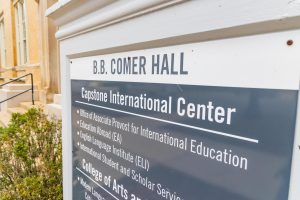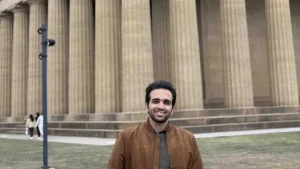Is COVID still a concern for campus?
November 18, 2021
The University of Alabama has announced multiple changes to its COVID-19 policies over the last few weeks. On Oct. 22, the University announced that it would comply with President Joe Biden’s executive order requiring federal employees to be fully vaccinated against COVID-19. A week later, on Oct. 29, an email sent to the campus community announced that the requirement for vaccinated individuals to wear masks indoors would be lifted on Nov. 5, with some exceptions.
‘A pre-COVID world’
With the mask mandate lifted, many students feel that there has been a return to pre-COVID-19 normalcy. For some, there is division on whether or not this is a positive or negative development.
Payton Greenlee, a sophomore majoring in marketing, said he feels that having “normal” life continue is more important than worrying about COVID-19, and that it wasn’t worth implementing COVID-19 restrictions at the expense of normal activities like in-person classes.
He said he did not think the University should have restrictions for COVID-19 when they did not implement them for other illnesses in the past.
“I have caught [COVID-19] before, and it affected me no different than having a fever does,” Greenlee said. “I don’t think the campus should be worried about COVID.”
Gabrielle Kirk, a freshman majoring in secondary education, said that as temperatures drop, it’s even more important for the campus community to be on its guard for a COVID-19 resurgence, and she criticized those who are celebrating the return to normal.
“We can’t get to a [pre-COVID-19] society unless people get their vaccine and booster shots and our body evolves to handle the COVID-19 strain,” Kirk said. “[Students] don’t want to get vaccinated, don’t want to wear a mask, don’t want to social distance, but want a pre-COVID world. Science and viruses don’t work like that.”
According to data released by the University on Oct. 22, at least 62% of UA students have received at least one dose of a COVID-19 vaccine.
Dr. Richard Friend, a member of the University of Alabama System Health and Safety Task Force and the dean of the College of Community Health Sciences, said the University is following the science in lifting its mask mandate for vaccinated individuals.
The Centers for Disease Control and Prevention says that “everyone should wear a mask in public, indoor settings,” regardless of vaccination status, in areas of substantial to high community transmission levels. Tuscaloosa County currently has a substantial level of local transmission, as it did when the University announced it would remove the mask mandate. When the mask mandate was lifted on Nov. 5, the county was experiencing a high level of transmission.
According to the CDC, a substantial level of COVID-19 transmission is considered to be between 50 and 100 cases per 100,000 people, or a test positivity rate between 8% and 10%. Tuscaloosa County currently has about 83 cases per 100,000 people, with 4.66% of COVID-19 tests in the county coming back positive.
Some students like Greenlee said they believe that COVID-19 is no worse than the flu and therefore is nothing to worry about. Friend did not offer a direct response to this, instead stressing that “we should still be concerned about COVID-19 and we still need to be concerned about the flu.”
Narratives that compare the flu to COVID-19 have been viewed with skepticism by public health authorities due to the disparities in the diseases’ respective death tolls and the fact that COVID-19 spreads faster than the flu. While the flu can be deadly for those who catch it — the CDC estimates that the flu kills between 12,000 and 52,000 each year — over 750,000 people have died from COVID-19 in the United States since the beginning of the pandemic, with that number climbing by the thousands daily. Overall, there is a consensus that COVID-19 is much more severe than the flu.
‘No one was held accountable’
A bill signed into law earlier this year by Alabama Gov. Kay Ivey prohibits state entities and private businesses from asking individuals to provide proof of vaccination. The law effectively renders the University’s updated mask requirements, which still require unvaccinated individuals to wear masks indoors, unenforceable.
“The state law is the state law,” Friend said. “I would just encourage [unvaccinated individuals] to do the right thing. They’re all on the honor system.”
The other two universities in the UA System, the University of Alabama at Birmingham and the University of Alabama in Huntsville, continue to require masks indoors on their campuses, despite having lower levels of virus transmission in their counties than in Tuscaloosa County.
UAB spokesperson Alicia Rohan said the policy is not likely to change anytime soon.
“UAB plans to maintain an indoor masking requirement for the rest of the calendar year while we continue to monitor local COVID transmission rates, hospitalizations, and other relevant data,” she said in an email.
Requests for comment from UAH were not returned.
Jefferson County, where UAB is located, has moderate levels of local virus transmission. Madison County, where UAH is located, is also in the moderate range. Both counties have significantly lower levels of transmission than Tuscaloosa County, which has a substantial level of transmission according to the CDC website tracking transmission levels in individual counties.
Sky Dunn, a junior majoring in history, said she is tired of the University saying one thing and then doing another. Due to her immunocompromised status, she is at higher risk of contracting severe COVID-19.
“The admin has failed miserably at their job of protecting students, faculty, staff and the greater Tuscaloosa community,” Dunn said. “It is utterly ridiculous that no one was held accountable.”
Dunn also stated that the requirement for unvaccinated people to still wear masks indicates that the University knows it’s not safe to unmask, but chose to change the policy anyways.
“By the admin writing the policy, they acknowledge that if you are not vaccinated, you need to wear a mask, which shows that they are aware that people should be wearing masks,” she said. “It does not resonate with the political beliefs of the admin of the school.”
The University has only cited Biden’s executive order for why it chose to lift the mask mandate. Open records requests for the specific information used to make the decision have not been answered.
‘Very few COVID-19 cases’
This semester has seen cases among students, faculty and staff drop significantly below the peak from fall 2020. Between Nov. 1 and Nov. 7, six students and three faculty or staff members have reported testing positive for the virus.
Between Aug. 9 and Nov. 7, 685 new cases have been reported among students, and 191 new cases have been reported among the faculty and staff. Around this point last year the University had more than 2,800 new cases reported by students during the semester, while about 340 cases were reported among faculty and staff in the same period this year.
“We have very few COVID-19 cases on our campus; our positivity rate is under 1%,” Friend said.
The number of cases this semester is significantly lower than last fall, but compared to last year, the University’s testing operations are less robust. Last year, the University required entry and exit testing, as well as sentinel testing for those who participated in on-campus activities.
Students can voluntarily be tested at the Student Health Center, University Medical Center or an off-campus medical provider, but they are no longer required to be tested regularly, with some exceptions for student-athletes.
Friend was unavailable for follow-up questions regarding the changes to testing resources.
‘Not everyone is vaccinated’
While campus COVID-19 cases on campus remain low this semester, transmission in surrounding Tuscaloosa County areas remain high, and it is still unknown how the lifting of some masking measures will affect campus infection numbers.
The University dashboard does not list the number of students who are fully vaccinated, only those who have received at least one dose. In order to be fully vaccinated, one must receive two doses of either the Pfizer or Moderna vaccines, or one dose of the Johnson & Johnson shot.
One dose of the Pfizer and Moderna vaccines provides significantly less protection. The protection afforded by vaccines have also been shown to decrease over time. Requests for information on how many students have been fully vaccinated have not been answered.
“If you don’t want to be vaccinated, chances are you probably don’t want to wear a mask or don’t wear one at all,” Dunn said. “They know that not everyone is vaccinated, and yet most people aren’t wearing masks.”
All UA employees are required to comply with the vaccine mandate by Jan. 4, but employees can apply for medical, disability or religious exemptions. A bill signed into state law on Nov. 5 by Ivey made it illegal for employers to fire employees who refuse a COVID-19 vaccine and claim a medical or religious exemption.
The University has not publicly outlined plans for employees who refuse the vaccine. There is currently no available information on how the University evaluates exemption requests, or how many people have requested one. The exemption request forms were taken down from the UA Vaccine Management Portal on Nov. 5 and made available again on Nov. 11.
‘Whatever measures are necessary’
Many students believe that the campus no longer needs to worry about COVID-19, citing reasons ranging from increased vaccination numbers to incorrect beliefs that COVID-19 is no worse than the flu.
“I think we are totally in the clear,” said Saylor Collum, a freshman majoring in public relations. “I think things are normal again, and we need to start acting that way.”
According to Friend, the campus should still be concerned about COVID-19.
“There’s still a lot we don’t know about COVID-19; we still have cases, very few cases but still, we have cases across the country and in young people,” Friend said. “I think everybody needs to get vaccinated and take the necessary precautions to try and prevent it.”
Friend said that the University is committed to keeping the campus safe, and that measures could be taken in the future if necessary.
“We will implement whatever measures are necessary, at the times necessary, to keep campus safe as we have done,” he said.
Dunn made it clear what she thought people should do if they think COVID-19 is no longer a concern.
“People who think we should move on from COVID-19 should get off Facebook and call [their] local hospital,” Dunn said. “See how many ICU beds are full and how exhausted the staff is from fighting this pandemic. Let’s try to get each other through this hard time instead of fighting each other.”
This story was published in the Rumor Edition. View the complete issue here.
Questions? Email the News desk at newsdesk@thecrimsonwhite.com.




















